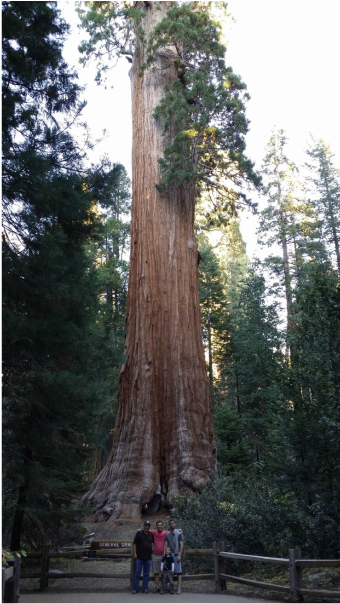It started from a tiny seed a fraction of an inch long. A park ranger told me these sequoia trees get so big because they produce a special chemical called tannic acid in their bark and wood that thwarts insects, decomposition, and fire. So they can grow over 3,000 years and just keep getting bigger and bigger.
My mind likes think of metaphors about things that impress me. So here I go. To be good mental health advocates, we must have some tannic acid within ourselves. Sometimes we get heat—even fire—in our efforts to overcome the stigmas and misinformation about mental illnesses. We are fighting centuries of ugly stereotypes. Unenlightened individuals sometimes make ignorant comments that can offend and discourage. We must be strong enough to not allow these occasions to get us down. Instead, we must use them to generate even more determination and enthusiasm within ourselves to carry on with courage.
I’ve wondered what it is exactly that that brings about this tannic acid in effective mental health advocates. I’ve concluded that it’s primarily two things: 1) They have healthy self-esteem so they are not easily offended, and 2) They really care about helping other individuals—perhaps to assist them avoid the pain they’ve experienced with mental illness or that they witnesses in loved ones.
There is a man in my town who has a lot of this tannic acid. His name is Lynn Bjorkman. We work together in our local NAMI affiliate and on other mental health projects in our community. He first got involved because he wanted to learn how he personally could aid family members who suffer from mental illness. A couple of years ago he was recognized as the volunteer of the year for NAMI Utah—a well-deserved distinction. Over the last year and a half, he’s created and grown a new organization I our county called “Reach 4 Hope” that fights suicide. He’s built a network of leaders from several mental health related organizations in our community to coordinate suicide prevention efforts. Schools, hospitals, mental health professionals, and other mental health promotion organizations are represented. He’s spearheaded the training of hundreds of individuals in QPR on suicide prevention techniques. His energy, organizational skills, creativity, and tenacity are remarkable. Many lives have been positively impacted.
I once helped Lynn with a booth on suicide prevention at a health fair in our city. When I arrived he told me a woman noticed our signage and approach him to comment on it. She said, “Our family doesn’t have those problems. We are good people of faith.” Lynn smiled as he related her words to me, being a bit taken back at her unenlightened boldness. But I also saw in his eyes—and later through his actions—how he was even more determined to help educate people.
I believe there have been suicide attempts in Lynn’s family. Lynn and his wife are very good, religious people. I’ve noted that they try to live their religion every day. Nevertheless, Lynn could have found the woman’s words to be very hurtful. But he didn’t appear to be offended at all…because Lynn has that tannic acid. With it, he has grown into an effective and enormously impactful mental health advocate—as giant in this realm as the great sequoias are among trees.



 RSS Feed
RSS Feed
